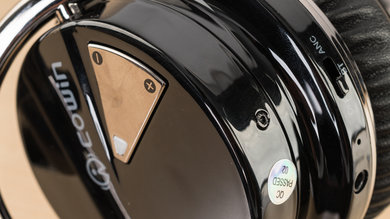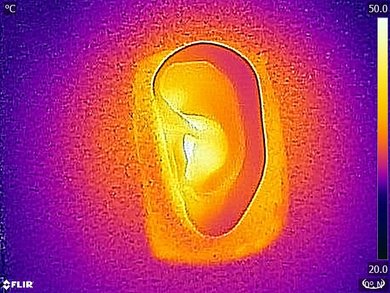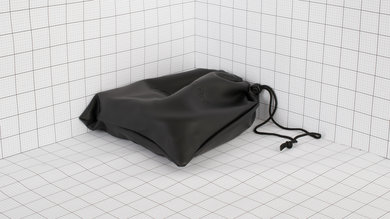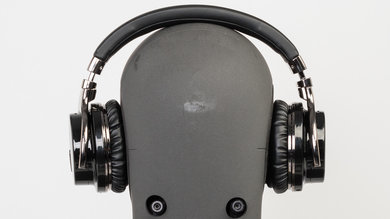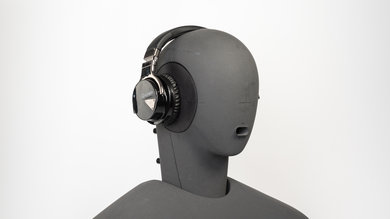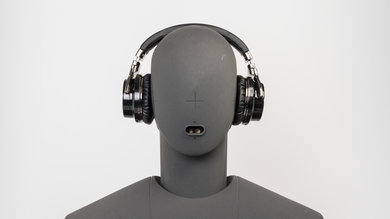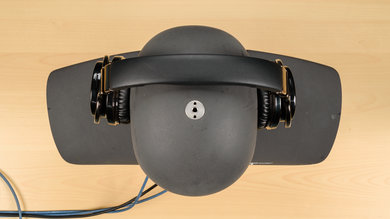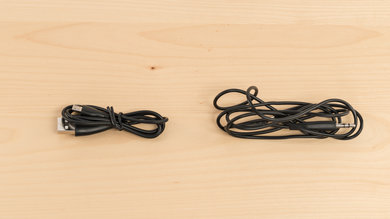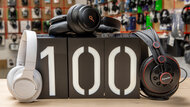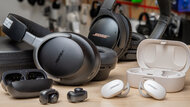The Cowin E7 are budget noise cancelling headphones with a great wireless range but mediocre sound quality. They're decent for most uses but tend to sound a little dark and muffled. On the upside, they have a moderately comfortable design, a long battery life, and block a decent amount of noise for commuting. Unfortunately, their budget price shows in their build quality, which feels a bit cheap at times.
Our Verdict
The Cowin E7 are passable for neutral listening. They have good bass and an average mid-range but lack a good treble performance, which makes them sound a bit dark and muffled. They also have a relatively narrow soundstage due to their closed-back, noise cancelling design. They won't be the best headphones for neutral listening.
-
Low leakage.
-
Great wireless range.
-
Good battery life.
-
Slightly bulky design.
-
Mediocre microphone.
Decent for commuting. The Cowin E7 Wireless block enough noise for moderately loud environments. They don't leak much and have a decent control scheme. However, they're a bit bulky and are not the most portable headphones to carry around on your person.
-
Low leakage.
-
Great wireless range.
-
Good battery life.
-
Slightly bulky design.
-
Mediocre microphone.
The Cowin E7 are decent for sports. They're wireless and have a tight fit on some listeners, which prevents them from easily falling off your head. However, they're a bit bulky for running and working out. They're also not as comfortable. They're a bit more breathable than most over-ears, but will still make you sweat more than usual during intense exercises.
-
Low leakage.
-
Great wireless range.
-
Good battery life.
-
Slightly bulky design.
-
Mediocre microphone.
The Cowin E7 are okay for office use. They don't leak much, at relatively high volumes so you won't distract your colleagues. They also block a decent amount of ambient noise but may not be able to cancel out the chatter of a particularly lively office. Unfortunately, they're not the most comfortable headphones to wear for really long and extended listening sessions.
-
Low leakage.
-
Great wireless range.
-
Good battery life.
-
Slightly bulky design.
-
Mediocre microphone.
The Cowin E7 aren't recommended for gaming. Their latency is likely to be too high for wireless gaming, they're not compatible with consoles via Bluetooth, and can't be customized to the extent of other gaming headphones. They also have a mediocre-at-best integrated microphone.
The Cowin E7 are mediocre for use as a wired gaming headset. Although they have well-padded ear cups and are decently comfortable, the headband is rather short and won't fit all head sizes. Latency shouldn't be an issue when they're used wired, and they have enough bass extension to produce deep thumps and rumbles. Their microphone is passable and recorded speech sounds understandable, but can come across thin and muffled.
-
Low leakage.
-
Great wireless range.
-
Good battery life.
-
Slightly bulky design.
-
Mediocre microphone.
The Cowin E7 are passable for making phone calls. Speech tends to sound thin and muffled but is still understandable. The microphone should be fine in a quiet setting, but it struggles to separate speech from background noise in a noisy environment.
-
Low leakage.
-
Great wireless range.
-
Good battery life.
-
Slightly bulky design.
-
Mediocre microphone.
- 6.1 Neutral Sound
- 6.8 Commute/Travel
- 6.8 Sports/Fitness
- 6.4 Office
- 4.9 Wireless Gaming
- 6.5 Wired Gaming
- 6.1 Phone Calls
Changelog
- Updated Nov 18, 2021: Converted to Test Bench 1.5.
- Updated Feb 06, 2020: Converted to Test Bench 1.4.
- Updated Nov 21, 2019: Converted to Test Bench 1.3.1.
- Updated Nov 21, 2019: Converted to Test Bench 1.3.
- Updated Feb 16, 2018: Converted to Test Bench 1.2.
Compared To Other Headphones
The Cowin E7 are average mixed usage headphones thanks to their great wireless range, good battery life, and decent noise cancelling. However, they're not the most comfortable pair of headphones compared to some of the other budget headphones we've reviewed. See our recommendations for the best headphones and the best-over ear headphones.
The Cowin E7 Pro Wireless are slightly better headphones overall than the Cowin E7 Wireless. The E7 Pro have a more balanced sound profile that favors instruments and vocals, compared to the E7's more bass-heavy sound. This makes the Pro variant a bit more suitable for fans of neutral sound. The E7 Pro also last a bit longer on a single charge than the regular E7, but take considerably longer to charge, too. On the other hand, the regular E7 performs almost as well in all other categories when compared to the Pro. The more bass-heavy profile also makes them a better pick for bass-lovers that want a noise cancelling wireless headset on a budget.
The Cowin E8 Wireless are better noise-canceling headphones than the Cowin E7. The E8 have a better noise canceling performance and are a bit more comfortable than the E7. They also have easier to use controls and a better-balanced sound overall. On the other hand, the E7 have more bass, which some listeners may prefer. They also have a longer battery life and support NFC, so they're a bit easier to pair with your phone.
The Mpow H5 Wireless are better budget noise cancelling headphone than the Cowin E7 Wireless. The Cowin have a better noise cancelling performance and a longer battery life. The Cowin also have a lightly clearer mic and a better isolation performance overall, since they also leak a little less. On the other hand, the Mpow look and feel a bit more premium, have better and less confusing controls, and also have a more comfortable fit even if they're a little tight on the head. The Mpow also have much better sound.
The Mpow H10 Wireless are better headphones than the Cowin E7 Wireless. They are more comfortable to wear for long periods of time and the padding is very soft compared to the rigid one on the Cowin. The Cowin also have mediocre sound quality with heavy bass and treble that lacks a lot of detail. The Mpow also isolate more ambient noise and will be better suited for commuting. The only thing that the Cowin have over the Mpow is that their battery life is slightly longer, but it takes more time to charge. However, this doesn’t overcome the massive difference in sound quality.
The Anker SoundCore Life 2 Wireless are better headphones than the Cowin E7 Wireless. The Anker are noticeably more comfortable, have a slightly better-build, and their sound quality is also better and more accurate. On the other hand, the Cowin don’t get as hot as the Anker after use and don’t have an in-line microphone like the Anker. The Cowin's build has a plastic feel, and their glossy finish is fingerprint-prone.
The Mixcder E9 Wireless are better headphones than the Cowin E7 Wireless. They are noticeably more comfortable, better built, and they offer a superior sound quality. The controls are also better, and the overall noise attenuation of the Mixcder is better than the Cowin. They also come with a nice hard case that protects the headphones better than the Cowin’s pouch. On the other hand, the Cowin offer more battery life and have NFC pairing, but that’s about it.
The Anker Soundcore Life Q20 Wireless are slightly better mixed-use headphones than the Cowin E7 Wireless. The Anker are quite a bit more comfortable, have better controls, feel better built, have a longer battery, and have much better ANC. On the other hand, the Cowin have a more balanced sound profile and lower overall latency.
The TREBLAB Z2 Wireless are better headphones for mixed usage than the Cowin E7 Wireless. The TREBLAB feel more comfortable and durable, have easier-to-use controls, and support multi-device pairing. Their sound profile is also much better-balanced, with a much more accurate treble range. On the other hand, the Cowin last longer off a single charge and have a slightly better ANC feature, though neither headphones block very much background noise.
Test Results
The Cowin E7 are well-padded and decently comfortable headphones, but the headband doesn't extend far enough to accommodate all head sizes. They're relatively lightweight and the padding used for the ear cups and headband is soft, which reduces some of the clamping effect that these headphones have on some listeners. They're not especially uncomfortable, but because the headband is rather short, they will feel a bit tight on larger heads. For a more comfortable budget headset, take a look at the Mpow H10 Wireless or the Anker SoundCore Life 2.
The button layout for the Cowin E7 feels a bit cramped but delivers good feedback. They have responsive and clicky buttons for volume control, call/music, and skipping tracks. They also have a dedicated switch to enable Bluetooth and noise cancelling. However, the cramped layout and the odd placement of the volume controls aren't as intuitive and may take some time to get used to.
The Cowin E7 are decently breathable for an over-ear design. They'll warm up your ears and make you sweat during more intense exercises, but you can listen to them for longer periods without being too bothered by the temperature difference. However, they won't be the most ideal headphones for sports or long listening sessions. In this case, in-ears or open-back headphones would be better options.
The Cowin E7 aren't particularly portable headphones. They're fairly large and they can't fold up to save space. The ear cups can lay flat, making them a bit more comfortable when resting the headphones around the neck.
The Cowin E7 have an ordinary build quality that feels a bit cheap. The headband is well constructed with a metal frame for reinforcement. However, the plastic used for the ear cups feels low grade and a bit cheap. They shouldn't break from a few falls, but the ear cups and hinges don't feel as durable as the more recent Cowin SE7 Wireless or even some of the other budget headphones we've reviewed in this price range.
These headphones are decently stable. They have a relatively tight fit on some heads, which means they won't move a lot during casual listening sessions and even a mild jog. However, they're not sports headphones. Due to their bulk and size, they still sway a lot during strenuous activities, so they won't be the most ideal headphones for running or working out. On the upside, they're wireless, so they won't get yanked off your head because the cable got hooked on something.
The Cowin E7 have a dark sound. The over-emphasis in the high-bass and low-mid introduces some muddiness, and there's a sharp dip in the high-mid and low-treble, making vocals and leads sound farther away and less detailed.
The frequency response consistency is great. The Cowin showed very little variance in bass delivery across our five human subjects. This could be due to their noise cancelling system, similar to what we noticed with the Bose QuietComfort 35 and the Sony WH-1000XM2. Overall, they should be able to deliver consistent bass and treble across multiple re-seats and users.
The Cowin E7 have a very good bass accuracy. They have great bass extension to produce a thumping sound, but the over-emphasis in the high-bass makes them sound a bit boomy.
The mid-range accuracy is mediocre. Low-mid is overemphasized, making vocals and lead instruments sound muddy and thick. The dip around 2kHz hurts the presence and projection of lead instruments.
The Cowin E7 have a bad treble accuracy. The overall response is rather inconsistent, which could result in an uneven treble. The lack of low-treble negatively impacts the presence and articulation of vocals and lead instruments. Mid-treble is also underemphasized, placing the overall treble tone and brightness just south of neutral.
The peaks and dips performance is mediocre. The huge dip in the high-mid and low-treble causes vocals and leads to sound distant, and the over-emphasis in the mid and high-treble can make the headphones sound piercing on some tracks.
The imaging is decent. The maximum weighted group delay of the Cowin is 0.21, which is pretty good. It can also be seen in the graph that the group delay is constantly below our audibility threshold. The rise in the group delay below 20Hz isn't ideal, but shouldn't be audible to most. Additionally, our test unit showed decent matching between the L/R drivers. This helps with accurate placement and localization of objects (like footsteps, voices, instruments) in the stereo image.
The soundstage of the Cowin E7 is poor. The PRTF response doesn't quite follow our reference speaker's in accuracy, size, or distance. Also, due to the closed-back design and active noise cancellation, their soundstage won't feel as open and spacious as open-back headphones. The overall soundstage will be average in size, but mediocre in distance and accuracy, which may be perceived as unnatural and located inside the listener's head.
There's no virtual soundstage feature on the Cowin E7.
The weighted harmonic distortion of the Cowin E7 is decent. There's slightly more distortion in the treble range when listening at moderate volume levels, but it shouldn't be noticeable for most people.
We used the settings above to test these headphones. Our results are only valid when using these settings.
The noise isolation performance of these headphones is okay but not as good as some similar headsets we've tested like the Anker SoundCore Space NC. The active noise cancelling system achieves about 8dB of reduction in the Bass Range which is below average. This range is occupied by the rumble of airplane and bus engines. In the mid and treble ranges, mostly occupied by speech, these headphones isolate passively using their ear cups, achieving 13dB and 33dB of reduction in the nid and treble ranges respectively. Both values are within decent limits. However, these headphones are a bit on the noisy side, performing below average in our self-noise test. See our recommendations for the best noise cancelling headphones.
The leakage performance is decent. The significant portion of leakage sits between 300Hz and 3kHz which is a relatively broad range and it covers most of the mid-range. This results in a leakage that sounds fuller and more comprehensible than the leakage of in-ears and earbuds. However, the overall level of leakage isn't too loud, so the leakage should not be an issue in most situations unless you blast music in a quiet environment.
The Cowin E7 have an integrated microphone.
The integrated microphone has a mediocre recording quality. Recorded speech sounds thin and muffled, but still comprehensible for the most part.
The noise handling of the mic is mediocre. In our noise handling test, it achieved a speech-to-noise ratio of 11dB, which means these headphones will mostly be suitable for quiet environments and will struggle to separate speech from background noise even in moderately loud environments.
They have a long-lasting battery life but a long charge time. Although they do give you about 45 minutes of playback from a 10 minutes charge, you have to leave them plugged in for more than 3 hours to charge them fully, which isn't ideal. On the upside, they can be used passively even while charging.
They don't have a mobile companion app.
Update 12/09/2021: These headphones were updated to Test Bench 1.5 and their latency values have changed. Our previous Test Bench 1.4 measurements reported 'PC Latency' at 164 ms, 'iOS Latency' at 151 ms, and 'Android Latency' at 130 ms. However, our new test bench uses an average of three measurements instead of one, resulting in 131 ms of latency on PC, 54 ms on iOS, and 46 ms on Android. As a result, we have updated our text to better reflect test bench 1.5 measurements.
These headphones have good Bluetooth connectivity and support NFC for easy pairing with smartphones. Unfortunately, they can't pair simultaneously with multiple devices but should be relatively easy to pair with one Bluetooth source. Overall, their latency on PCs as well as Android and iOS devices is also fairly low, so you shouldn't notice delays between your audio and visuals. That said, if you're looking to reduce audio latency further, check out the Audio-Technica ATH-M40x, which have a wired design.
The Cowin E7 can only be used wirelessly via a Bluetooth connection.
The Cowin E7 come with an audio cable with no in-line remote or USB adapter. This means that while they can be used wired with gaming consoles, you won't be able to use the microphone.
The Cowin E7 can be used wired by plugging it into the Xbox One controller, however, the microphone won't work. If you want a headset that's fully compatible, check out our recommendations for the best Xbox One gaming headsets.
These headphones don't have a base/dock. If you want a versatile headset with a base that you can also use wired, check out the Arctis Pro Wireless by SteelSeries.
Comments
Cowin E7 Wireless: Main Discussion
Let us know why you want us to review the product here, or encourage others to vote for this product.




